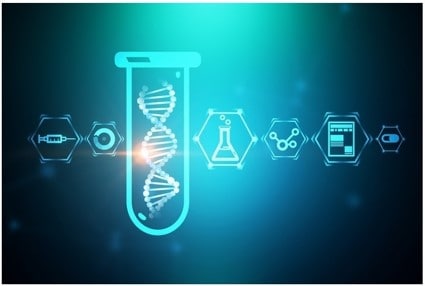Table of contents
DNA tests help individuals learn more about themselves, from health testing to resolving paternity disputes to ancestry. The beauty of this test depends solely on its accuracy. Any errors in the results can lead to misinformation and improper steps taken depending on the goal of the DNA test. However, receiving results with false information can cause confusion, frustration, and even faulty medical advice. How accurate are DNA tests? In this article, we will review the accuracy of DNA tests on the market.
Thus, the test must be perfected to obtain an accurate result. To ensure perfection of the test, you must patronize reliable companies that have the required expertise, facilities, and approval. In this article, we’ll go into details about the essence of performing DNA tests, how accurate the test is, and the right companies you can trust to serve you right, among others.
How accurate is a DNA test?
Most DNA tests are highly accurate. Over the years, DNA sequencing has become more accessible in terms of price and being able to perform the procedure entirely at home. The process of reading genetic markers is highly accurate if performed in a reputable laboratory by well trained scientists. Most labs are CLIA-accredited and CAP-approved, indicating that the results obtained by the lab can be interpreted by any medical professional.
There are some isolated instances where the DNA company is not accurate. In 2018 for instance, an NBC Chicago reporter sent his dog’s DNA to multiple human DNA testing companies to be sequenced and analyzed. Most DNA companies failed to read the sample, but Orig3n provided a 7 page human report on the false DNA. In 2020, the company had removed most of the DNA products from its website and was in the middle of a lawsuit involving its license to run a clinical laboratory due to COVID-19 testing issues.
Why take a DNA test?
Consumers perform DNA tests for several reasons, and there are different types of tests for each customer goal.
Forensic science
Scientists perform DNA tests for crime investigation. Just like in other cases, there’s no room for error in this case. They can investigate suspects by analyzing DNA samples found at the crime scene. Such samples can come from hair strands, fingerprints, and bloodstains, among others. The principle of this technique is that each individual has a unique DNA. If they can deduce who the sample belongs to at scenes involved with the investigation, they can confirm or exclude who may have been involved in the crime.
Did you know there are services that collect contributed DNA to help solve cold cases. DNASolves is one such company that you might be interested in checking out!
Disease screening
Medical research and genetics is one crucial branch of DNA research. Again, there’s no room for error in carrying out this test to avoid giving false claims.
Accuracy in DNA testing helps determine whether an individual is prone to a disease or not even before they begin to feel the symptoms. Some diseases are deeply rooted in genes. Hence, merely treating symptoms might not be the best solution in that regard. Therefore, medical experts often recommend DNA tests to know if the patient’s genetic composition is the reason for the disease predisposition. Clinical DNA tests almost always need to be ordered for a customer by a medical professional. Here are a few reviews of these types of tests on our blog:
- Ambry Genetics (risks of various disease types)
- Color (risks of cancer, genetic forms of heart disease, and medication responses)
- GeneDx (wide variety of clinical genomic tests)
- Integrated Genetics (pre- and post-pregnancy tests)
- Invitae (diagnostics, proactive health, and reproductive health)
- Myriad Genetics (diagnostics, reproductive tests, and precision medicine tests)
- Parsley Health (holistic medicine and health plans)
- Pathway Genomics (DNA tests for various health aspects, may be used in consultation with medical providers)
- Veritas Genetics (disease risks and carrier screenings)

Discover your ancestry
People who are interested in learning more about their origin and building their family tree can opt for at home DNA tests. With DNA ancestry tests, they can trace back their ancestors up to ten generations or 1000 years back. The test will help to deduce their ancestors’ country of origin and even their ethnicity estimates. They can even discover haplogroups to show where their ancestors lived. Most ancestry DNA tests also use DNA matching to help customers find living and recently deceased relatives. An accurate DNA test helps to link you with your past and connect with your ancestors.
23 and Me and Ancestry DNA are two of the most popular sites for discovery ancestry. At Nebula Genomics, you can upload raw DNA data from these two companies for free and unlock our extensive, weekly updated reports! Other popular ancestry companies include CRI Genetics, DNA Land, DNA Painter, GedMatch Genesis, LivingDNA, and MyHeritage. Most of these companies also accept raw data, making it easy to compare the accuracy of DNA tests and find additional information.
Establish paternity
When we talk about DNA tests, the first thing that comes to an average person’s mind is paternity.

In case of paternal dispute when they can’t establish the biological father, a DNA test can settle the matter. This DNA test is based on the principle that children inherit 50% of their genes from each parent. Thus, by testing the child’s DNA and comparing it with the alleged fathers, there will be a 99.9% match between the child’s DNA and the father.
HomeDNA is one of the most popular at-home paternity tests available. However, it should be noted that the test is not available in New York state and cannot be used as a legal paternity test.
Why must DNA Tests be accurate?
There are grave implications for the inaccuracies of a DNA test. Thus, there are several reasons why the test must be accurate. Some of these reasons include:
In forensics: As discussed, a DNA test can help to determine whether a person is guilty of a crime or not. If the test is not well done, the wrong person might be found guilty. Thus, in forensic, DNA testing must be accurate.
In medicine: A DNA test must be accurate if it’s done for a medical purpose. For instance, if an error occurs when testing an individual’s predisposition to a disease, the false positive result may lead an individual to seek treatment for a potential disease when they are not actually predisposed to it.
The physician may base their treatment on such a result, and being a false treatment, the person might suffer complications. Therefore, the DNA test must be accurate to guide the physician about making suitable treatment decisions.
In ancestry: The essence of performing an ancestry DNA test is to understand your family history and where your ancestors came from. However, if the result is inaccurate, that may mean you’ll be linked with a false ancestor. For instance, if your ancestors originated from Nigeria, Africa, and you’re an African-American, an inaccurate result might link your ancestor to another country.
You do DNA tests to ascertain specific facts; hence the result must be accurate. If you rule out the accuracy, then there’s no reason to do the test.

In paternity dispute: A paternity DNA test is a highly sensitive test that indicates the real father of a child. Should any error occur, the wrong person may be established as the child’s father. Situations like this nullify the basis of performing the test. Hence, the test result must be accurate.
Things that may affect your DNA test result accuracy
Some factors may affect the accuracy of your DNA results.
Sample contamination
It is not hard to contaminate a DNA sample if you’re not careful with sample collection. If you submit a contaminated sample to the DNA laboratory, you may end up having an inaccurate result. Most times, the DNA company will tell you the sample is not able to be analyzed. If other human DNA gets mixed into the sample, you may simply receive an inaccurate result. To avoid this mistake, ensure you read your DNA kit instructions carefully and understand the sample collection process well.

Some DNA tests require your blood sample, while others only need a saliva sample or cheek swab. If the kit comes across any contamination before or after sample collection, it may affect your result. If you allow other external factors such as flies or external droplets to get into your sample, your result may be compromised.
You may also get an inaccurate result if you take the sample by scrubbing your tongue or other parts of your mouth.
Patronizing an unaccredited laboratory
Most people patronize any DNA laboratory they find around, perhaps because of their low price. Patronizing an unaccredited laboratory might result in having an inaccurate result. This may be because they lack the facilities and knowledge needed to perform an accurate test.
Variant analysis and database size
Even if the process of DNA sequencing is accurate, you might still not receive the most accurate result you want. And you may find yourself questioning inaccuracies if you compare your sequenced DNA across more than one company. Sometimes, different companies give you different results. This is usually not a cause for concern.
Most traits and disease types, if they are genetic, are the result of a combination of probabilities of different genes. Different companies will often analyze different genetic variants. So while one company might say you are not predisposed to a certain trait, another company might say you are because they tested a different variant. And even if you do possess a genetic variant predisposing you to a trait or disease, oftentimes environmental and lifestyle factors will contribute to your chances of developing it.
DNA is very good at determining close family relations such as siblings or parents. For ancestry tests, the most common complaint is that a customer does not receive enough information about their ethnicities or does not find enough common ancestors. This error is often caused by limited database sizes.
When a customer sequences their DNA with a company, it is added to the company’s reference population database. As more sequences are added to the database, the company’s predictions become more accurate and more DNA matches can be made. For instance, most DNA databases have many matches for European populations but far fewer matches for those of East Asian decent. At Nebula Genomics, we partner with FamilyTreeDNA, which hosts one of the largest Y DNA and mtDNA databases in the world to provide you with the most accurate result.
Nebula Genomics offers the most accurate DNA tests
Nebula Genomics is a reliable DNA company offering excellent testing services. Most of the DNA companies you know only test 0.02% of your DNA. Thus, their results are less accurate. This is not the case with Nebula Genomics. We use Whole Genome Sequencing to decode 100% of the human genome and produce 10,000 times more data than other genetic tests.
Plus, we read each sequence 30-100 times, ensuring that any errors are accounted for and removed. For instance, you may see a certain variant in 1 of 30 reads. Since that variant was only seen once and a different variant was read the other 29 times, it can be safe to conclude that the 1 variant was an error. Our technology is one of the reasons we are one of the best DNA companies you can patronize if you desire to get an accurate result.
We’re what you can call a “privacy-first DNA company.” This is because we ensure that customers’ genetic information is well protected. We ensure you can begin your journey of discovery without risking your privacy.
How accurate are dog DNA tests? To learn more about the benefits and limitations of DNA tests for your furry friend, check out our reviews of Embark, DNA My Dog, Paw Print Genetics, and Wisdom Panel!
